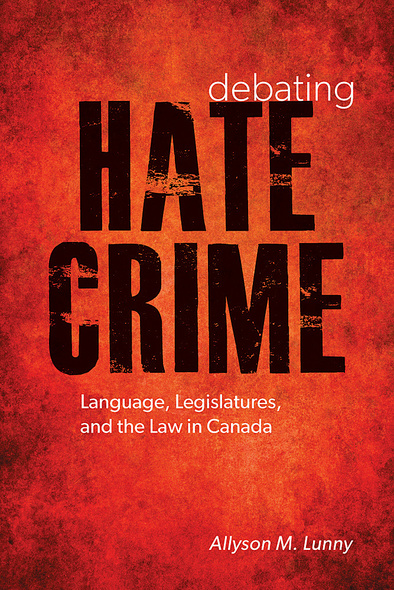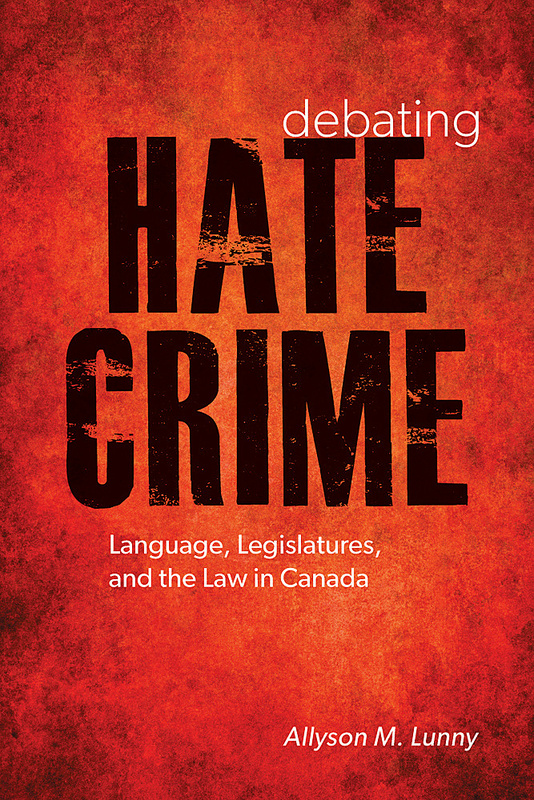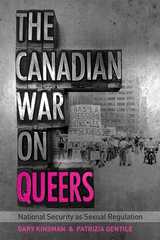
Debating Hate Crime examines the language used by parliamentarians, senators, and committee witnesses to debate Canada’s hate laws. These lively legislative debates and committee hearings reveal much about party politics, public policy, and social issues.
Allyson Lunny explores how the tropes, metaphors, and other linguistic signifiers used in these debates expose the particular concerns, trepidations, and anxieties of Canadian lawmakers and the expert witnesses called before their committees. In so doing, Lunny reveals and interrogates the meaning and social signification of the endorsement of, and resistance to, hate law. Specifically, she examines three legislative areas: criminal hate propaganda, section 13 of the Canadian Human Rights Act prohibiting the telephonic communication of hate messages, and the enhanced sentencing provision of the Criminal Code. Often much larger than liberal concerns over freedom of speech and expression, these debates articulate and imagine risk and threat beyond libertarian concerns. The result is a rich historical and analytical account of some of Canada’s most passionate public debates on victimization, rightful citizenship, social threat, and moral erosion.
This unique work will appeal to socio-legal scholars and graduate students interested in hate crime, policy-making, and discursive analysis.
This contribution to UBC’s 'Law and Society' series analyzes parliamentary debate touching on sexual identity and gender expression at the federal level. Lunny explores ways this debate provides a forum for, and a reflection of, the struggle over social meaning in Canadian society … The work fits squarely within scholarship that sees the social meaning of, and discourse around, identity and social inclusion/exclusion as mutually constructed. It is also relevant to those who study balances between individual and group rights, federal and provincial governance, and parliamentary and charter precedence in Canadian politics today while providing a comparative study for those who have examined similar issues in US or European discourse. Summing Up: Recommended. Upper-division undergraduates through faculty.
This book is indeed a fascinating read and an insight into how attitudes toward the language of hate crime laws have evolved over the years.
Debating Hate Crime uses discursive analysis as a critical lens to uncover the common tropes that support and resist proposed initiatives revolving around hate crime protections for vulnerable communities. This is a crucial exercise in exposing the impacts of personal and political morals on public policy. This book represents a significant contribution to the limited field of hate studies in Canada.
Debating Hate Crime makes a distinctive and important contribution to hate crime scholarship. Allyson M. Lunny argues that the debates that take place in the process of policy formation and law reform at the national level are a microcosm of wider society and, as such, tell us much about that society and its concerns. The approach and insights offered by this Canadian study have importance for all those interested in hate crime initiatives across the world.
Allyson M. Lunny is an associate professor in the Law and Society program at York University. She has published in the areas of sexuality, law, and critical psychoanalysis. Her publications include “‘Look, a Faggot!’: The Scopic Economies of Cruising, Queer Bashing, and Law,” “Provocation and ‘Homosexual’ Advance: Masculinized Subjects as Threat, Masculinized Subjects Under Threat,” and “Heimlich Maneuvers: Freud’s Analytic Seduction of the Wolf Man.”
Introduction: The Political and Affective Language of Hate
1 Hate Propaganda and the Spectre of the Holocaust
2 Legislating Victims of Hate
3 Bill C-250: A Censoring of Religious Freedom or a Protection Against Hate?
4 The Trans “Bathroom Bill”
5 The Baby and the Bathwater: The Repeal of Section 13 of the Canadian Human Rights Act
Conclusion
Notes; Bibliography; Index





